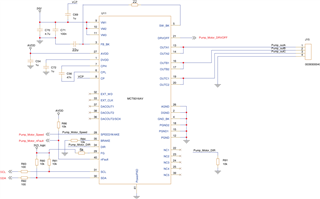Other Parts Discussed in Thread: , MSP430FR2311, MSP-EXP430FR2311, MSP430FR2355, MSP-EXP430FR2355, MCF8316A
Hi,
I am having problems with even getting a first I2C contact with this device. At first, when the FG pin did not have a pullup I only got NACK after the first byte. After adding the FG pullup the device does not reposnd at all and seems to hang the I2C bus after the first DeviceID transmission, only a full power cycle resets the system.
This is my circuit. Can you see any problems with it? Regards, Goran.


